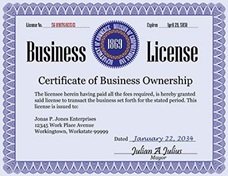How to Get a Business License in Michigan is an exciting venture, but before you begin operations, you need to ensure that you have the necessary business licenses and permits. Understanding which licenses apply to your business, how to apply, and how to maintain compliance can save you from legal trouble and financial penalties.
This comprehensive guide will walk you through the entire process, covering who needs a business license, types of licenses, application procedures, costs, and renewal requirements.
Why Do You Need a Business License in Michigan?

A business license is a government-issued permit that allows you to legally operate in Michigan. This ensures that businesses comply with local, state, and federal regulations.
Key Reasons to Obtain a Business License
- Legal compliance: Operating without a license can result in fines, penalties, and even business closure.
- Consumer trust: A licensed business appears more credible and trustworthy to customers.
- Tax compliance: Businesses that sell products or services must collect sales tax, which requires proper licensing.
- Regulation compliance: Certain industries (e.g., health, food, legal services) have strict regulations to protect public safety.
Not all businesses need a state-issued general business license, but most require specific permits or industry-related licenses.
Who Needs a Business License in Michigan?
While Michigan does not have a statewide general business license, many businesses must obtain permits at the state, county, or city level.
Businesses That Typically Require a License
- Retail and service businesses (e.g., restaurants, salons, auto repair shops)
- Construction and home improvement contractors
- Medical, legal, and financial professionals
- Real estate agencies and brokers
- Manufacturing and industrial businesses
- Food and beverage establishments (including food trucks and catering)
- Alcohol, tobacco, and cannabis-related businesses
Check with your local government and state agencies to confirm whether your business needs a license.
Types of Business Licenses in Michigan
Depending on your business type, location, and industry, you may need multiple licenses or permits.
1. Local Business Licenses
Michigan does not issue a statewide general business license, but many cities and counties require businesses to obtain one.
- City or county clerk’s office issues these licenses.
- Fees and requirements vary depending on your location.
For example:
- Detroit, Grand Rapids, and Ann Arbor require local business licenses for certain industries.
- Smaller towns may only require a DBA (Doing Business As) registration.
2. Professional and Occupational Licenses

Many industries require licensing through Michigan’s Department of Licensing and Regulatory Affairs (LARA). These include:
- Doctors, nurses, and healthcare providers
- Lawyers and accountants
- Cosmetologists and barbers
- Construction contractors and electricians
- Real estate agents and brokers
3. Sales Tax License
If your business sells tangible goods, you need a sales tax license from the Michigan Department of Treasury to collect and remit sales tax.
- Apply online at Michigan Treasury Online (MTO).
- No fee is required for a sales tax license.
4. Employer Identification Number (EIN)
If your business:
- Has employees
- Operates as an LLC, Corporation, or Partnership
- Needs to open a business bank account
You must apply for an EIN from the IRS (available for free at www.irs.gov).
5. Zoning Permits
Before opening a brick-and-mortar business, check zoning laws in your city or county.
- Some areas restrict home-based businesses.
- Certain industries (e.g., manufacturing, cannabis dispensaries) have zoning restrictions.
6. Health and Safety Permits
Businesses dealing with food, health, or hazardous materials need:
- Health permits from the Michigan Department of Agriculture & Rural Development.
- Environmental permits if handling hazardous waste.
7. Liquor and Tobacco Licenses
- Liquor licenses are issued by the Michigan Liquor Control Commission (MLCC).
- Tobacco and cannabis businesses require special state licensing.
Step-by-Step Guide to Getting a Business License in Michigan
Step 1: Determine Your Business Structure
Before applying for a license, choose your business structure:
- Sole Proprietorship – Simple, but no liability protection.
- Limited Liability Company (LLC) – Popular for small businesses; provides liability protection.
- Corporation – Ideal for large businesses with investors.
Register LLCs and Corporations with LARA.
Step 2: Register Your Business Name
- If using a DBA (Doing Business As) name, register it with your county clerk’s office.
- If forming an LLC or Corporation, your name is registered automatically with LARA.
Step 3: Obtain an EIN (If Required)
Apply for an Employer Identification Number (EIN) for free at www.irs.gov.
Step 4: Apply for a Sales Tax License
- Register with the Michigan Department of Treasury online.
- Required if selling physical products.
Step 5: Check Local Licensing Requirements
Visit your city or county clerk’s office to determine if additional business permits are needed.
Step 6: Apply for Industry-Specific Licenses
If your business requires a professional license, apply through LARA.
Step 7: Comply with Additional Regulations
- Home-based businesses may need zoning permits.
- If hiring employees, register with Michigan’s Unemployment Insurance Agency (UIA).
Step 8: Renew Your Licenses
Most licenses require renewal every 1-3 years. Keep track of deadlines to avoid penalties.
How Much Does a Business License Cost in Michigan?
Costs vary by business type and location.
Estimated Costs:
| License Type | Estimated Cost |
|---|---|
| DBA Registration | $10 – $25 |
| LLC Formation | $50 |
| Sales Tax License | Free |
| Local Business License | $50 – $500 |
| Professional License | $50 – $300 |
Where to Apply for a Business License in Michigan
Online Resources
- Michigan Business One Stop (www.michigan.gov/business)
- LARA Licensing Portal (www.michigan.gov/lara)
- Michigan Department of Treasury (www.michigan.gov/treasury)
In-Person Application
If your city requires a local business license, visit your city clerk’s office.
Common Mistakes to Avoid When Applying for a Business License

- Not researching local requirements – Licensing rules differ by city/county.
- Failing to register a DBA name – Required if operating under a different business name.
- Skipping sales tax registration – Essential for retail businesses.
- Ignoring renewal deadlines – Avoid penalties by renewing licenses on time.
Conclusion
Obtaining a business license in Michigan is a step-by-step process that varies depending on your industry and location.You can legally operate your business in Michigan without any issues. Stay updated with renewal requirements to keep your business compliant.
Disclaimer
This article is for informational purposes only and does not constitute legal or financial advice. Business licensing requirements may change, and specific regulations vary by city and industry. Always consult with Michigan state agencies, local government offices, or a legal professional to ensure compliance with the latest business laws.










